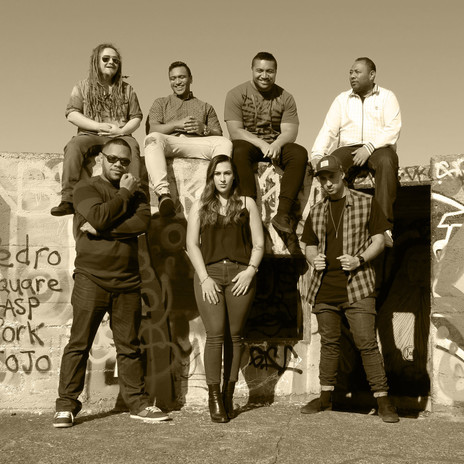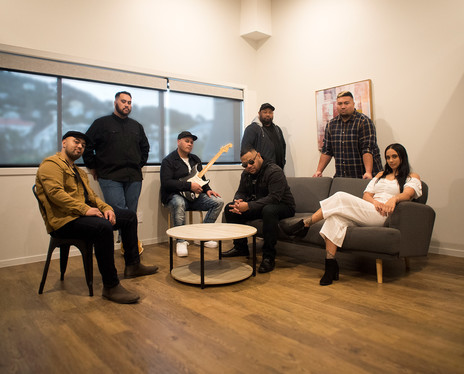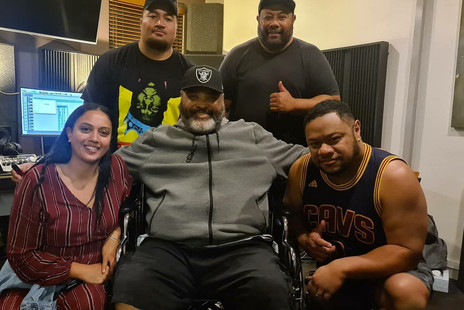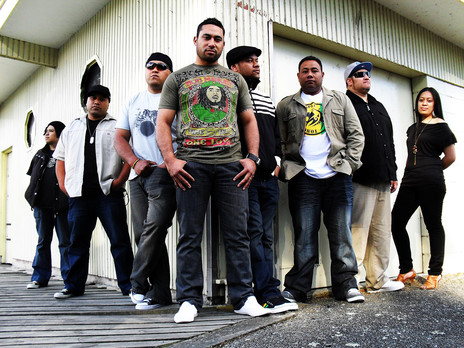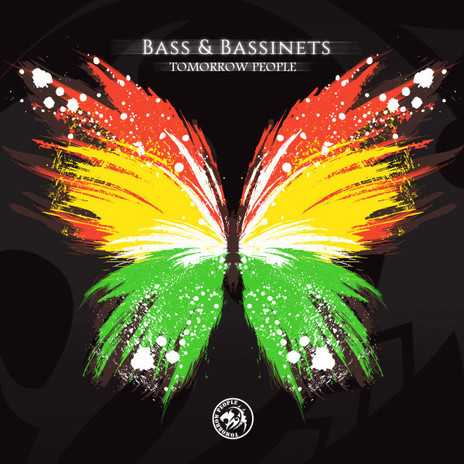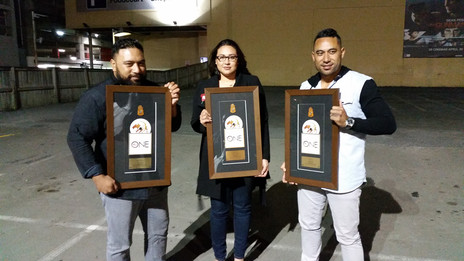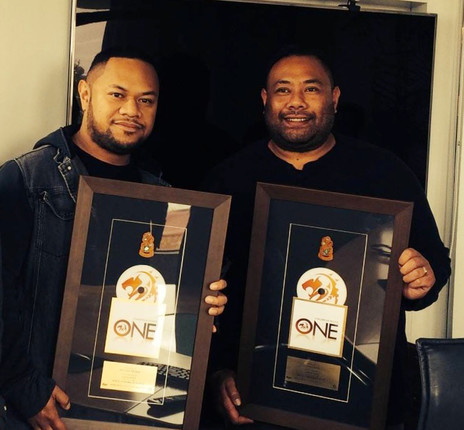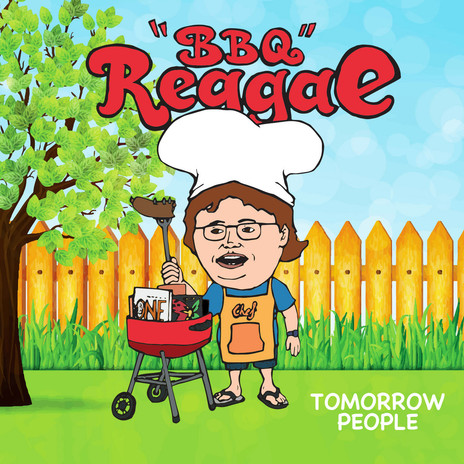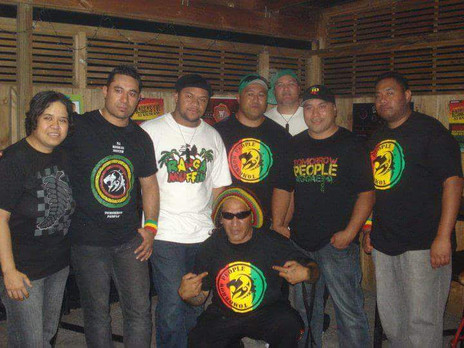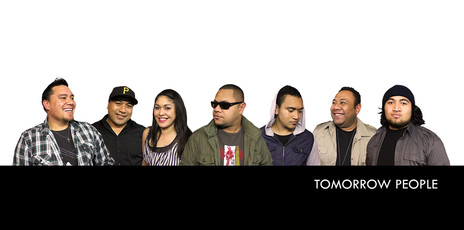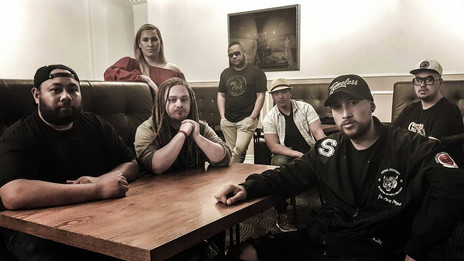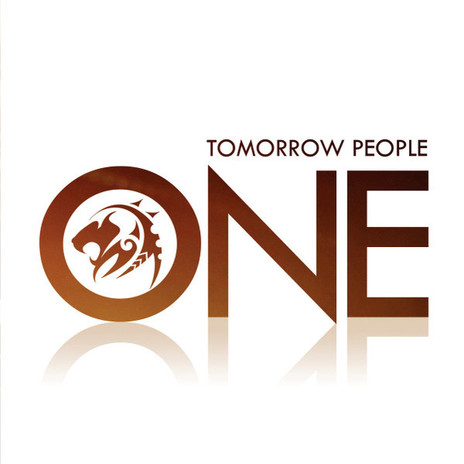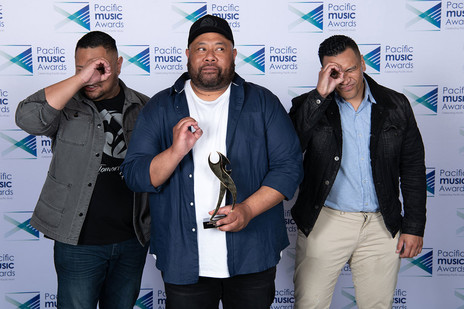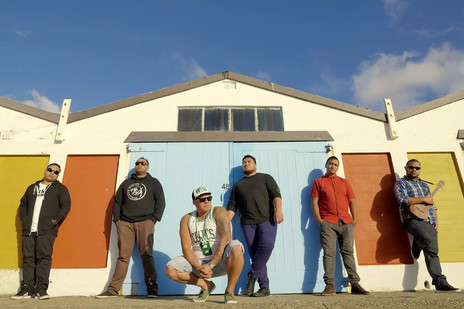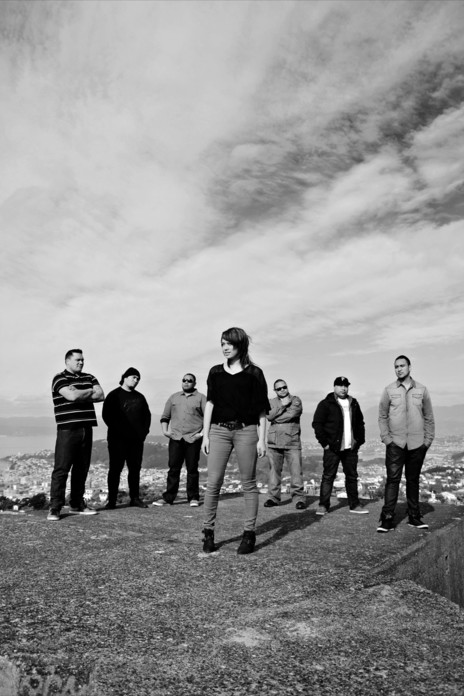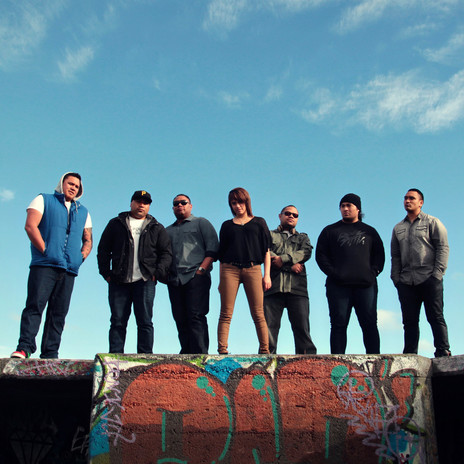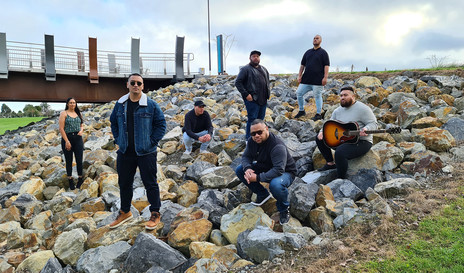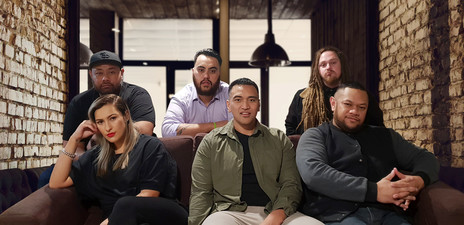“My home studio was set up bit by bit over time starting in the early 2000s,” he says. “My family had an old school Pentium 4 PC with Cool Edit Pro and Fruity Loops (that may or may not have been cracked), and an old stage mic with a baby sock over the top of it because we couldn’t afford a pop filter. Tana and I were formerly part of an island band called Terakey and that was the first album we ever recorded using that gear. The album [Tribute, 2003] is actually up on Spotify now, 20 years on since its release. Over the years we’ve reinvested anything we made off music to add gear to the studio. Everything we’ve learnt about recording and engineering is self taught by reading pages and pages of tutorials (pre-YouTube), to more recently watching tutorial videos online so we could keep learning.”
Avina ran the studio alongside keyboardist Tana Tupa’i, and later they were joined by bassist Lio Fili and singer Liam Va’ai. Their approach to recording remained flexible and when necessary they would just set up in someone’s bedroom, which led to recording sessions across Wellington – from Tawa to Karori to Miramar.
their early sound was taken from a mix of UK Lovers’ Rock and Polynesian music
In late-2010, they began posting songs to YouTube and supplied links for fans to download the mp3s for free. Avina says their sound was taken from a mix of UK Lovers’ Rock and Polynesian music.
“A lot of our early sound was based off the songs from UB40. They were a huge inspiration to us, probably because it’s what our parents were listening to when we were growing up, so naturally we warmed to their sound. We were also inspired by the sound of Hawaiian reggae, namely by Fiji who is still the Godfather of Island Reggae. We all knew his songs and played them live as covers (in Terakey) so it was only natural that when we started writing music, his style fed into what we were doing.”
The original four members then put together a live band with singer Analote Faletolu, drummer Elia Feterika, guitarist Aaron Davey and keyboardist La’i Lepou. This led to their first show, as Avina recalls:
“Our guitarist Aaron Davey was good mates with the promoter of a Three Houses Down show in Masterton so he gave us the opportunity to play a support slot. From there we connected with other promoters and events organisers, and pitched our band to play support. Raggamuffin was always a goal, and that’s one where we had to prove ourselves to get onto that bill. By that time we had a bit of a following so that made things a bit easier. I remember being at the first Raggamuffin festival in Rotorua and standing in the audience thinking to myself ‘one day I’m going to play on that stage’. Very clichéd I know, but that was the goal.”
Tomorrow People then played their own shows throughout the North Island, soon reaching the point where they could headline large venues like San Fran in Wellington. This gained them the attention of South Auckland label, Illegal Musik, who had a P&D (pressing and distribution) deal with Warner Music.
A golden start
For their first official single ‘Feel Alright’ they collaborated with Hawaiian group Kolohe Kai, who were keen to connect with local audiences before their upcoming tour of Aotearoa. The song was released in March 2011 and that same month Tomorrow People showed their international aspirations by playing their first show in Australia. Within a few months the laidback groove of ‘Feel Alright’ saw it become one of the most played songs on urban radio that year.
This success led to their first summer festival slots, performing at the Exodus New Year’s Eve festival and Raggamuffin in 2012. They already had a backlog of songs so could release one every few months to keep their momentum up, though they sometimes refreshed the original versions – most notably ‘Souljah Feeling feat Chad Chambers’ which was remixed by House of Shem. Both the original and the remix became hugely popular online and on radio.
By the time of their first album, 2012’s One, they were averaging over 50 shows a year and had a dedicated following, so it wasn’t long before they had amassed gold sales. The album also won Best Reggae Roots Album at the Waiata Music Awards. The band was made up of Māori and Samoan members, so it also received nominations at the Pacific Music Awards. Avina was blown away by the response.
“It was a huge buzz for us,” he says. “Considering that this was an album that we wrote, produced, recorded, mixed and mastered ourselves on a zero budget (and before “bedroom producers” were a thing) and tutorial knowledge, we were in shock that it even made it that far. To have a gold plaque presented to us was a surreal moment.”
One has since gone on to receive platinum certification.
Before the release of One, Liam Va’ai announced that he wanted to leave the group, but fortunately Avina had planned for this disruption.
By the time of their first album, 2012’s ‘One’, they were averaging over 50 shows a year
“As soon as Liam indicated he was wanting to leave, we brought in Luke Whaanga and re-recorded a couple of songs, ‘Souljah Feeling’ and ‘Little Story’, with Luke’s vocals. I also produced and arranged one of Luke’s original songs, ‘Irie Music’, and added it to One before the release date. This was to ensure that we could actually tour the album post-release.”
Next up came the 2013 EP One.5, which had Whaanga singing alongside Johanna Tepania and keyboardist Kenape Saupese (Kensau). It also reached the Top 20.
In 2013, Avina worked with Rio Panapa (Sons of Zion) on a charity single to support the organisation Mana Ririki, which is dedicated to fighting child abuse. They decided on a cover of ‘Sensitive To A Smile’ by Herbs and brought together members of Aotearoa’s most loved reggae groups – House of Shem, 1814, Sons of Zion, Three Houses Down, Katchafire, Ria Hall, Chad Chambers, NRG Rising, Majic Paora, and Tasty Brown. Māori Television filmed a documentary on the project, which further extended its reach, and the single went to No.2.
Taking BBQ reggae to No.1
Tomorrow People still weren’t successful enough that the members were able to give up their day jobs and the demands of the band saw a steady turnover of members. Avina Kelekolio continued to guide the production of their music, with the assistance of Tana Tupa’i and Hennie Tui. Bass and Bassinets (2015) saw the band perfecting their Lovers’ Rock sound. This variety of reggae was created in the UK and was a good-time style that eschewed the political weight of Rasta-influenced reggae. This gave Tomorrow People their own niche within the local reggae scene, one that fitted in with the overall Pacific reggae sound.
The unstoppable rise of local reggae had seen a backlash over the time that Tomorrow People had been in existence. The term “BBQ reggae” was used to criticise the local variety for lacking the grit and political attitude of original reggae. Tomorrow People self-consciously wanted to create music that people might enjoy at a laidback gathering and this led them to describe their sound as ‘Sunshine Reggae’.
One particularly scornful critic of local reggae was music blogger Simon Sweetman, who effectively wrote off the entire genre in a review of Six60, claiming the band were part of a “cruel and punishing second wave of BBQ reggae. A whitewash of never-quite-brown-enough sounds.”
Tomorrow People reacted with humour. They called their 2018 mini-album BBQ Reggae, and the cover art showed a cartoon of Sweetman cooking some sausages on a small outdoor grill.
“I remember when I first read Simon’s article,” Avina explains, “and although he wasn’t talking about us – it felt like he was downplaying the type of music we were making. At first we felt a bit attacked like we were ‘not worthy’ musicians, but then look at where Six60 are now with their ‘BBQ reggae’! We wanted to turn that negative into a positive and embrace the term ‘BBQ Reggae’ so that cover art was like a tribute to the person that popularised the term.”
They launched the album at One Love festival, allowing attendees to buy the CD before it was widely available elsewhere. This burst of physical sales saw BBQ Reggae push Ed Sheeran out of the No.1 slot.
“We wanted to turn that negative into a positive and embrace the term ‘BBQ Reggae’ ”
There were other remarkable elements to the release. One song, ‘Don’t Want To Fight It’, was featured in three different versions – in English, in Māori (‘Whangai Aroha’), and in Samoan (‘Sa’ili Le Alofa’). They also delved into dancehall for the first time on ‘Where I Stand’ which featured Jamaican toaster Conkarah. BBQ Reggae went on to receive a Waiata Music Award and five Vodafone Pacific Music Awards. Tomorrow People were now one of the top reggae acts on the NZ festival circuit and they regularly toured across the Tasman.
It was an amazing effort for a band who ran its own affairs, and this was recognised at that year’s Music Managers Forum, where Tana Tupa’i and Avina Kelekolio were named “Best Self-Managed Artist”. However, the band’s progress threatened to be disrupted when they were forced to part ways with singer Marcus Abraham. He had a physical altercation with his girlfriend, which led to him being taken to court where he was discharged without conviction. The band released a statement saying that they did not condone any form of domestic violence.
Fortunately, the line-up of Tomorrow People had continually changed over the years, so they were able to smoothly adapt to the departure of members. Singer Hamokiterangi “Hamo” Dell had been with them since Bass & Bassinets (2015) and she came to the fore on their next single ‘Kua to te ra’, which was a translation by Tawaroa Kawana of their song ‘No Good’. It was a heartfelt song that Dell had written about a boyfriend who cheated on her.
With the band’s core line-up completed by drummer Dan Sugrue, they continued onward to play their summer bookings, which included big shows such as One Love festival.
The new era
Tomorrow People’s next single saw them work with an act who’d been an early inspiration for the group, Fijian-born, Hawaiian based singer George Veikoso, better known as Fiji. It was released in various remixed forms, so there were versions to suit the tastes in the different Pacific islands and a club remix by DJ Noiz, which led to the song gaining over 10 million streams. The band continued to be popular as a live act and won four awards at the Pacific Music Awards in 2019. Their only new song was ‘Fever’, but it was enough to see them named Best Pacific Roots/Reggae Artist at the 2020 awards.
The band gained two new singers over this period.
“Snow Chase was part of another band,” Avina explains, “so we knew him through the scene and were good friends. When that stuff happened with Marcus, the timing wasn’t great as we had a winter tour coming up that we had committed to. Not wanting to ever cancel a tour, we asked Snow to jump in as a guitarist and a backing vocalist. It seems that after all these years, he hasn’t left.
“Te Aranga [Ara] joined the group via a nationwide auditioning process. Our female singer before that [Hamo Dell] was pregnant with her first child and wanted to take a break from music. We ran a campaign called ‘Sing your way to Homegrown’ looking for our next female vocalist. With just under 100 entries, we ran multiple video audition rounds until we got down to the top five. From there, it was the Mai FM audience that voted on the winner, which was Ara.”
Te Aranga “Ara” Savage showcased her beautiful voice on ‘Lose Track of Time’ which was also released in a te reo Māori version as ‘Rere Te Wa’. Her vocal talents were matched by male singers, Kenape and Snow, and the combination of their voices ensured the band would continue to be known for their beautiful harmonies. Avina and Tana continued to be at the core of the group, alongside bassist Hennie Tui and drummer Duane Te Whetu.
In 2021 they decided to take a new approach. It felt like the historic way of releasing an album was less relevant to modern listeners, who have less attention span for absorbing a whole collection in one go. However, Tomorrow People weren’t keen to just release sporadic singles, since this would lose their sense of momentum.
they decided to release a new single on the first Friday of every month for an entire year
Instead, they decided to release a new single on the first Friday of every month for an entire year – their #firstfridays campaign. These were then collected on the album, 21. The opening of ‘Just A Little Bit’ made clear the RnB undercurrent that filtered through much of their work, though after half-a-minute that familiar “Sunshine Reggae” offbeat rhythm returned to up the energy levels. Tomorrow People also did a version of the Beach Boys’ ‘Don’t Worry Baby’, allowing themselves the freedom to play it in a classic pop style rather than adhering to their usual reggae sound.
Around this time, Kenape left the band and Fredwyn Kisona was brought in as vocalist, becoming one of the group’s lead singers alongside Ara and Snow.
This experiment with doing a cover song led naturally to their next project – a series of versions of classic songs, which started in 2023. Once again, the band arranged to release each new song individually as a single in the lead-up to an EP. They started with Dr Hook’s ‘A Little Bit More’ and the Eagles’ ‘Best of My Love,’ which Fredwyn chose to sing since it is one of his wife’s favourite songs.
The group were also included in a ground-breaking new event in Samoa, the Motherland Festival. Tana Tupa’i was involved initially through his work at Pacificast, though as the concept became reality he was also hired to be the festival director. He brought together some of the finest Samoan musicians from around the world, including J Boog (California), HP Boys (Melbourne), Lisi (Sydney) and Aotearoa’s own Savage.
Of course, Tomorrow People also had to be on the line-up. Fortunately their two Māori singers were more than happy to learn to sing in Samoan for the event. Another example of how the band use the positive vibes of their “Sunshine Reggae” to represent for their culture and to uplift their people with music.
Tomorrow People now have their own unique place within reggae in Aotearoa and Avina is proud that they were able to forge their own path.
“At a time when the reggae scene was more roots based, Tomorrow People came out with a sound that was different and fresh,” he says. “We couldn’t really write roots music as some of the topics and subject matter would not have felt real to us here in New Zealand. We have always had at least three lead vocalists who chop and change both on the studio recordings and during live performances. With any Tomorrow People song, the singer who is on the song may change, but the ‘sound’ remains consistent. There aren’t many reggae bands that have a female lead singer doing her own songs, so that is another unique point, more so in this day and age.”
